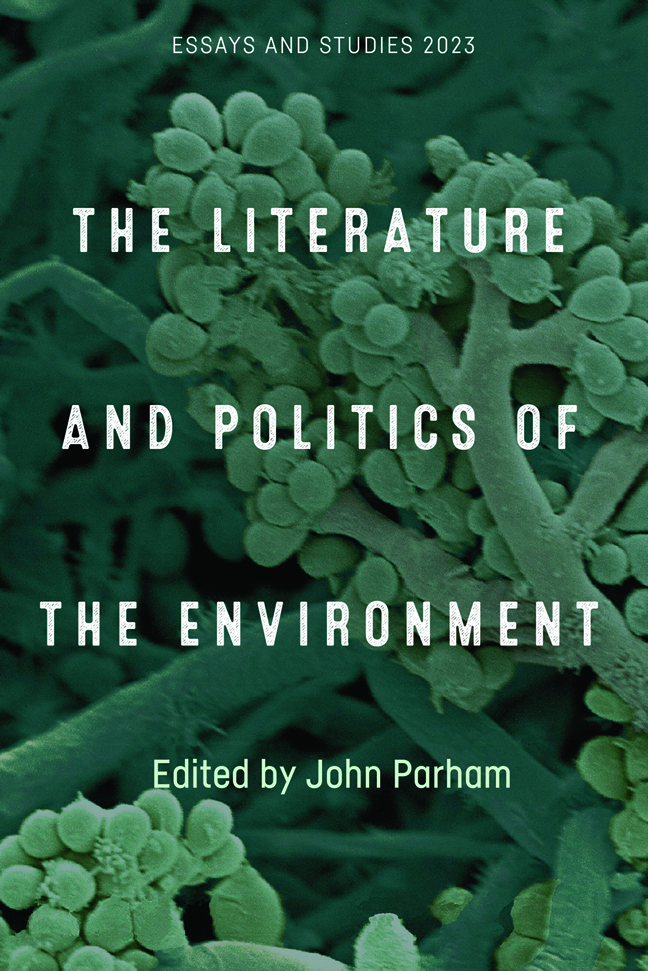Book contents
- Frontmatter
- Contents
- Notes on Contributors
- Acknowledgements
- Introduction
- 1 Industry and Environmental Violence in the Early Victorian Novel: Pastoral Re-visions
- 2 Floating Cities, Imperial Bodies: Reading Water in Timothy Mo’s An Insular Possession (1986) and Xi Xi’s ‘Strange Tales from a Floating City’ (1986)
- 3 Sweet Food to Sweet Crude: Haunting Place through Planet
- 4 Nonhuman Entanglements in Adam Roberts’s Science Fiction: Bête (2014) and By Light Alone (2012)
- 5 Sum deorc wyrd gathers: Dark Ecology, Brexit Ecocriticism, and the Far Right
- 6 Literature, Literary Pedagogy, and Extinction Rebellion (XR): The Case of Tarka the Otter
- 7 The View from the Field: Activist Ecocriticism and Land Workers’ Voices
- 8 Nature Walking: Marching Against Privilege
- 9 To Be a Witness in the World
- Index
6 - Literature, Literary Pedagogy, and Extinction Rebellion (XR): The Case of Tarka the Otter
Published online by Cambridge University Press: 02 March 2024
- Frontmatter
- Contents
- Notes on Contributors
- Acknowledgements
- Introduction
- 1 Industry and Environmental Violence in the Early Victorian Novel: Pastoral Re-visions
- 2 Floating Cities, Imperial Bodies: Reading Water in Timothy Mo’s An Insular Possession (1986) and Xi Xi’s ‘Strange Tales from a Floating City’ (1986)
- 3 Sweet Food to Sweet Crude: Haunting Place through Planet
- 4 Nonhuman Entanglements in Adam Roberts’s Science Fiction: Bête (2014) and By Light Alone (2012)
- 5 Sum deorc wyrd gathers: Dark Ecology, Brexit Ecocriticism, and the Far Right
- 6 Literature, Literary Pedagogy, and Extinction Rebellion (XR): The Case of Tarka the Otter
- 7 The View from the Field: Activist Ecocriticism and Land Workers’ Voices
- 8 Nature Walking: Marching Against Privilege
- 9 To Be a Witness in the World
- Index
Summary
Extinction Rebellion’s ‘fifth principle’ states that ‘We value … [f]ollowing a cycle of action, reflection, learning, and planning for more action’. This chapter will examine what this may mean in relation to literature (and the teaching of literature) and what implications it may have outside the class-room. XR activist academics have argued that the environmental emergency demands, as Tema Milstein says,
[r]adical modes of sustainable education (including regenerative pedagogy, which tends to the global shift to restore, respect, and regenerate ecological and societal balance, and inside-out pedagogy, which helps learners take their inner seeds, sprouts, and blossoms of good ecocultural intentions to stages of external fruition) [that] speak both to educating learners and engaging the public.
The Extinction Rebellion Universities group similarly states in its ‘Declaration of Rebellion’ that
We celebrate all forms of learning; opening our hearts and minds to the diverse perspectives and experiences within human understanding; amplify-ing the voices of those long teaching the inherent value and knowledge within the Earth’s life-systems; and exploring the role of the arts alongside the sci-ences in tackling climate change, the spiritual alongside the material.
The urgency of the issues at stake inevitably militates for such a language of effect and affect and morality. However, as Timothy Clark argues in The Value of Ecocriticism, such aims have embedded in them both the language of a neo-liberal agenda of agency, impact, choice, voices, story, and experience, which are elsewhere held to be deeply implicated in the production of the environmental catastrophe. Helena Feder, in her introduction to Close Reading the Anthropocene, similarly warns that ‘[i]n the Age of “Man,” the question of signification may all too easily reify the systems it claims to challenge, if not describe’. This article will discuss what is less often raised about the trap of reification: the question of representation, frequently assumed to be the grounding for activism, literary reading, and pedagogy. Representation also tends to operate in tandem with the critical languages of affect, especially in relation to empathy, attention, and imagination.
- Type
- Chapter
- Information
- The Literature and Politics of the Environment , pp. 109 - 126Publisher: Boydell & BrewerPrint publication year: 2023



